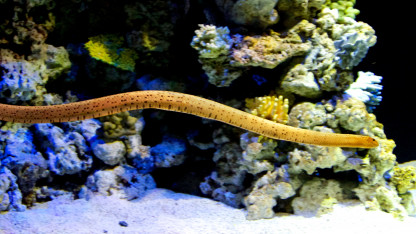The National Aquarium Denmark – Den Blå Planet is the only place in Europe and one of the few places outside of Australia where genuine sea snakes can be found. The sea snake is one of the few reptiles that lives its entire life in saltwater. And its very powerful venom is many times more toxic than cobra venom. Every year, people die from sea snake bites, often while fishing.
In late-2013, the National Aquarium Denmark – Den Blå Planet participated in an international sea snake expedition to New Guinea and Sulawesi, and subsequently now has sea snakes from Australia on exhibition. These sea snakes are the focus of the research project: “The distribution, taxonomy, conservation status, physiology and toxicology of the sea snake”.
The project comprises multiple sub-projects investigating, among other things, how sea snakes are able to dive for such long periods of time, how oxygen binds in their blood and the composition of their extremely powerful venom. Furthermore, a new type of electronic tagging is being developed to make it easier to study sea snakes in their natural habitats.
Video: Extremely poisonous sea snakes move in to Den Blå Planet, National Aquarium Denmark (in Danish)
Video: Tapping venom from sea snakes bears fruit (in Danish)
By studying the composition of the venom, the project may also be able to help us produce a synthetic anti-venom that could save many lives. In addition, the individual components in sea snake venom are being tested to see if they have an effect on cancer cells.
Duration: 2014-2017.
Partners: Arne Redsted Rasmussen, Royal Danish Academy of Fine Arts School of Conservation, Tobias Vang, Aarhus University, Brian Lohse, Faculty of Health and Medical Sciences (SUND), University of Copenhagen, Kate Sanders, University of Adelaide.

